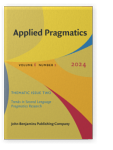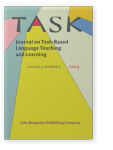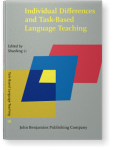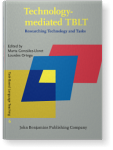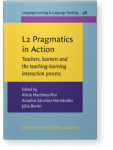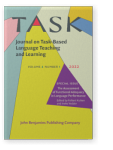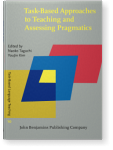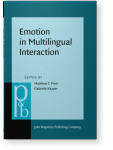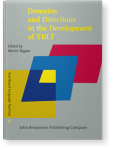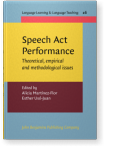Marta González-Lloret
List of John Benjamins publications for which Marta González-Lloret plays a role.
Journals
Book series
Title
Technology-mediated TBLT: Researching Technology and Tasks
Edited by Marta González-Lloret and Lourdes Ortega
[Task-Based Language Teaching, 6] 2014. vi, 336 pp.
Subjects Applied linguistics | Language acquisition | Language teaching
2024 Technology-enhanced pragmatic instruction Trends in Second Language Pragmatics Research Part 2, pp. 132–147 | Article
Developing pragmatic competence in another language is not an easy task for language learners, especially in foreign language settings which are deprived of real and rich interactions with different speakers of the target language in a variety of contexts. For more than a decade, researchers of… read more
2023 Foreword L2 Pragmatics in Action: Teachers, learners and the teaching-learning interaction process, Martínez-Flor, Alicia, Ariadna Sánchez-Hernández and Júlia Barón (eds.), pp. xvii–xxii | Foreword
2022 The present and future of functional adequacy The Assessment of Functional Adequacy in Language Performance: Special issue of the Journal on Task-Based Language Teaching and Learning 2:1 (2022), Kuiken, Folkert and Ineke Vedder (eds.), pp. 146–158 | Article
The concept of Functional Adequacy (FA) proposed by Kuiken and Vedder, and the research conducted by the authors in this special issue is pushing the field of Task- Based Language Teaching (TBLT) and Task-Based Language Assessment (TBLA) towards a more inclusive understanding of what it means to… read more
2018 Chapter 8. Pragmatics, tasks, and technology: A synergy Task-Based Approaches to Teaching and Assessing Pragmatics, Taguchi, Naoko and YouJin Kim (eds.), pp. 191–214 | Chapter
This chapter explores the relationship among pragmatics, tasks, and technology when the goal is to support the development of pragmatics in a new language (L2). We view L2 pragmatic competence as culturally and situationally specific and inseparable from authentic communication, which encompasses… read more
2016 The construction of emotion in multilingual computer-mediated interaction Emotion in Multilingual Interaction, Prior, Matthew T. and Gabriele Kasper (eds.), pp. 289–311 | Article
This chapter investigates the construction of emotion in L1-L2 Spanish in computer-mediated (CM) text interaction. Based on a corpus of text-based conversations between L1 Spanish users and intermediate L2 speakers of Spanish, analysis shows that both groups employ a range of multisemiotic… read more
2015 Staking out the territory of technology-mediated TBLT Domains and Directions in the Development of TBLT: A decade of plenaries from the international conference, Bygate, Martin (ed.), pp. 59–86 | Article
In this chapter we survey areas of current interest in the use of technology for taskbased language teaching (TBLT) purposes and identify promising directions for pedagogy and research. We begin by reviewing the two vibrant topics of interaction and cognitive task complexity. We conclude that… read more
2014 Chapter 2. The need for needs analysis in technology-mediated TBLT Technology-mediated TBLT: Researching Technology and Tasks, González-Lloret, Marta and Lourdes Ortega (eds.), pp. 23–50 | Article
Needs analysis (NA) is an important component of any well-developed language curriculum and an essential component of a task-based language curriculum (Long & Crookes 1993; Long & Norris 2000). It is actually “the first stage in the design of a TBLT program” (Long 2007, p. 124). In this chapter,… read more
2014 Chapter 1. Towards technology-mediated TBLT: An introduction Technology-mediated TBLT: Researching Technology and Tasks, González-Lloret, Marta and Lourdes Ortega (eds.), pp. 1–22 | Article
Computer and online-communication technologies have given rise to new tasks in the real world. The present collection* is based on two premises: (a) that rapid digital technological change fuels constant transformations in learning and language use, continually creating new language education… read more
2010 Conversation analysis and speech act performance Speech Act Performance: Theoretical, empirical and methodological issues, Martínez-Flor, Alicia and Esther Usó-Juan (eds.), pp. 57–74 | Article
Conversation analysis offers the potential for useful contribution to the study of speech act performance by microanalysing the sequential organisation of natural data of participants carrying out social action through talk. This paper outlines some of the similarities and main differences between… read more
